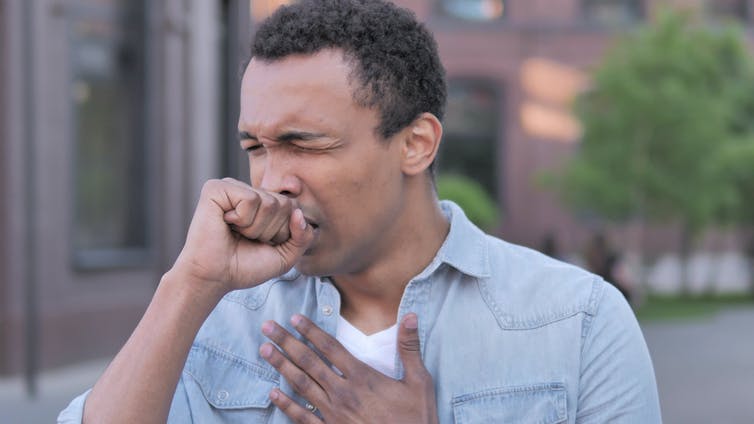
Kamil Macniak/Shutterstock
As soon as omicron was first identified in Botswana and South Africa, two key questions arose: whether this new variant was more infectious than earlier ones, and whether it caused more or less severe disease.
It’s clear from how rapidly the variant has spread and how quickly cases have increased that it is more infectious. But the question of whether omicron has less harmful effects than previous variants – whether it is less “virulent” – is somewhat more complex.
Early results from South Africa (which are still awaiting review) suggested that patients with omicron were less likely to be admitted to hospital than before. And research found that even when admitted, people were less likely to require oxygen, need mechanical ventilation, be admitted to intensive care or die.
But South Africa has a young population compared to much of the world. A relative lack of older, more vulnerable people catching the virus may have been masking the variant’s capabilities. Whether omicron would also cause milder illness in other countries was initially unclear.
However, information accrued over the past month has shown that South Africa’s experience isn’t an anomaly. Data from most European countries, including the UK, supports the suggestion that omicron is generally causing less severe disease than previous variants.
This is most clearly seen in the recent trajectory of the epidemic in Britain. Analysis by the UK Health Security Agency suggests that omicron is only about a third as likely to lead to a hospital admission compared to the delta variant.
Of course, if daily omicron infections rise to a very high number, as they have, then hospitalisations will also rise. In the final few days of 2021, hospital admissions of COVID-positive people increased quite substantially, but still didn’t surpass levels seen during previous waves. And critically, we haven’t yet seen the number of patients occupying mechanical ventilation beds start to rise.
Partial immune evasion
Several different factors might explain why this is happening. First up, there’s immunity. It could be that prior immunity – which thanks to previous infections and vaccination programmes is now much more common across many parts of the world than in previous waves – is sufficient to reduce rates of severe disease.
For protection against an initial infection, located in the nose and throat, antibodies against a key part of the coronavirus’s outer structure – its spike protein – appear to play the greatest role. However, these wane over time. Plus, many of the mutations found on omicron affect the spike protein, and so are likely to impair the antibodies’ ability to bind to the virus, reducing the effectiveness of a vaccine or prior infection at preventing new infections.
But for protection against a more severe infection, which tends to be located in the lungs, other immune responses could be playing a more dominant role, such as killer T cells. These are a type of white blood cell that kills foreign substances as well as the body’s own cells that have been infected with the virus.
And early research, yet to be reviewed by scientists, suggests that omicron has very few mutations to the parts of the virus that T cells target. This implies that immunity built up in the past that’s potentially more effective against severe disease should still largely be intact.
This could be a powerful explanation as to why omicron’s virulence appears lower. In the UK, for example, it’s estimated that close to 95% of adults have some form of immunity to the virus through vaccination or infection.
Mutating towards mildness
But might omicron also be intrinsically less virulent than previous variants, even in those with no prior immunity? This is more difficult to be certain of, though there are some signs that suggest it might be.
Firstly, omicron has several mutations near to a part of its structure called the furin cleavage site, which is thought to play a role in virulence. In laboratory experiments where the virus’s furin cleavage site was deleted, the virus showed reduced growth in human respiratory cells and caused less severe disease in laboratory animals. It’s plausible that the mutations around the furin cleavage site could explain some of the reduced virulence of omicron.

Stockbakery/Shutterstock
Several groups have also studied the ability of omicron (or a similar pseudovirus) to grow in tissue cells. These studies – which are also awaiting review – report that the virus grows less well in lung tissue but better in the tissue of the upper airway compared to previous variants.
Enhanced growth in the upper airway could lead to more virus being shed through the nose and mouth, which might help explain in part why omicron is more infectious. And given that infection of the lungs, rather than the upper respiratory tract, is what’s associated with more severe disease, the reduced ability of the variant to grow in the lungs could also be an important factor in explaining reduced virulence.
Overall, whatever the mechanism, the evidence that omicron is causing less severe disease than previous variants is now adding up. But this doesn’t mean we should see it as less of a threat. Ultimately, the impact omicron will have on public health will depend on how many people become infected. Because it’s much more infectious, we might still end up with many people getting severely ill, even if the proportion of infected people getting severely ill is lower. The need to try and contain the spread of the virus remains, at least for the time being.
![]()
Paul Hunter consults for the World Health Organization (WHO). He receives funding from the UK National Institute for Health Research, the WHO and the European Regional Development Fund
























